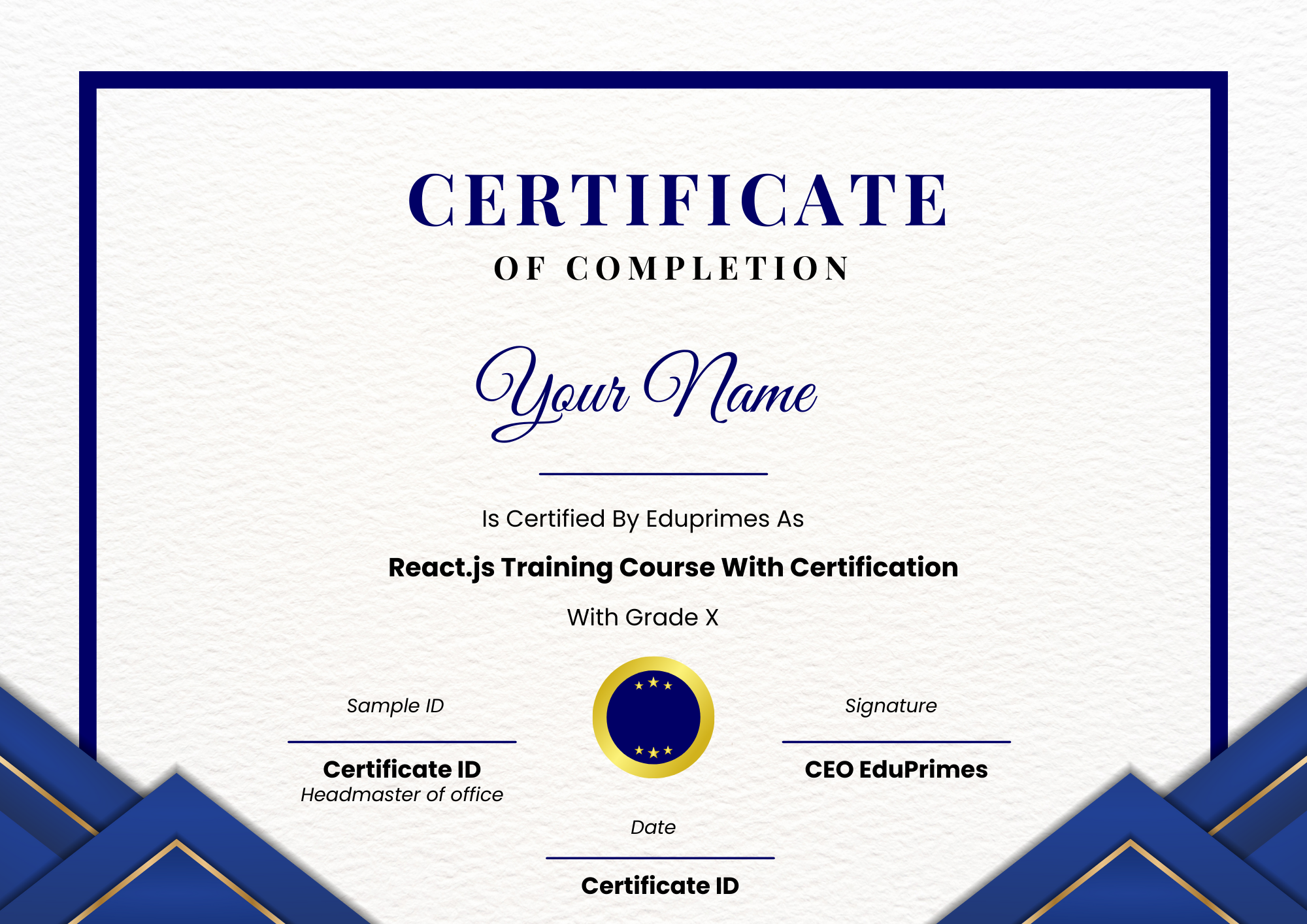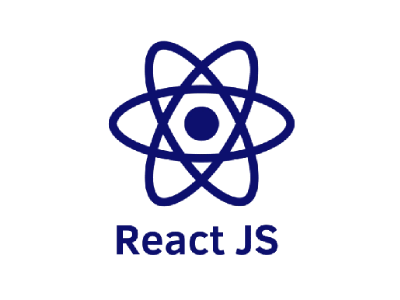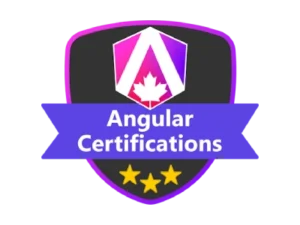React.js Training Course With Certification
By learning the fundamentals of React, Redux, and React Native, the Eduprimes React Certification Training will provide you with the skills necessary to develop effective React apps. You will learn how to create basic components and incorporate them into more intricate design elements in this Advanced React Course. Following the completion of this React online course, you will be able to create applications using React concepts like JSX, Redux, Asynchronous Programming with Redux-Saga middleware, Data Fetching with GraphQL, Testing with Jest, App Deployment with Nginx and Docker in order of preference, and Mobile Application Development with React Native.
Overview
About React Course
A JavaScript package called React makes it possible to create effective and responsive user interfaces for online and mobile applications. It lets you create intricate user interfaces (UIs) with tiny, independent code segments called “components.” React can power native apps using React Native and do server-side rendering with Node. You can create cross-platform, consistently behaved apps using React JS that are also simple to test and implement.
Training Highlights
- 36 Contact Hours with Live, Instructor-Led Sessions
- Mentor-Led Guaranteed Exam Pass Study Plan
- Unlimited Attempts to 5 Mock Tests
- 500+ Premium Exam Questions Exclusive from PMI
- Exact PMP Exam Questions Replica Set from PMI
- Rejoin Refresher Courses with 180-Day Grand Pass
- PMP Exam Application Assistance
- Comprehensive Career Support with Job Boost 360
- 24 Contact Hours On-Demand Course by Experts
- Hands-On Practice with a Question Bank of 2000+
- 5 Full-Length Exam Simulations
- 12 Full-Length Simulation Tests (180 Qs Each)
- Exclusively from PMI: Videos, eBook, Assessments, Guide
- Regular Doubt-Clearing Sessions
- Comprehensive Exam Prep Support
- The World's Top PMP Exam Prep Partner
React JS Course Syllabus
The foundational concepts covered in the React JS curriculum include state, props, JSX and React components, and more. After addressing these foundational ideas, we will proceed to more complex ideas like component building, unit testing, styling, and data flow between components, among other useful tools.
Objectives of our React JS Certification Training
- Develop a proper understanding of Web Development Architecture
- Create application using React components
- Perform Navigation using Routes
- Build Web Applications using React with Redux
- Program Async Actions using Redux-Saga Middleware
- Write Queries using GraphQL
- Execute Test Cases using Jest
- Deploy Applications using Docker and Nginx
- Build Mobile Applications using Native React
Who should go for this Advanced React Course?
- Freshers and Aspiring Frontend (JavaScript) Developers
- UI/UX Developers
- Web Developers
- Software Developers
- Developers upgrading from Angular, Vue and other similar UI JavaScript Frameworks
What are the system requirements for this React JS course?
- Memory – Minimum 4 GB RAM
- Processor – Intel Core i3 CPU @2.00 GHz or later
- Storage – 20 GB HDD/SDD or above
- Operating System – Windows 7 or later, Ubuntu 14 or later
- Visual Studio Code (for web application development) and Expo (for mobile application development)
- Chrome or Mozilla (latest version)
Our Package
- Building Blocks of Web Application Development
- Single-page and Multi-page Applications
- Different Client-side Technologies
- MVC Architecture
- Introduction to React
- Installation of React
- JSX and its use case
- DOM
- Virtual DOM and Its Working
- ECMAScript
- Difference between ES5 and ES6
- NPM Modules
- React Elements
- Render Function
- Components
- Class Component
- Component Constructor
- Functional Components
- Multiple Components
- Props
- Props with Class based Component
- Props with Function based Component
- States
- Component Lifecycle
- React Events
- React Forms
- Different Form Concepts
- Styling in React
- Inline Styling
- CSS Stylesheet
- Building Music Shop Application using React Components
- Routing
- React-router
- Features of React-router
- Configuration of routing using React-router
- Navigation using Links
- 404 page (Not found Page)
- URL Parameters
- Nested Routes
- Implementing styles using NavLink
- Application Programming Interface
- Build a REST API using JSON-server
- API consumption in React application using Fetch method
- Build a dynamic Music Store application using Routing and API connectivity
- Need of Redux
- What is Redux?
- Redux Architecture
- Redux Action
- Redux Reducers
- Redux Store
- Principles of Redux
- Pros of Redux
- NPM Packages required to work with Redux
- More about React-Redux package
- Need of Async operations
- Async Workflow
- Action Creators
- How to write Action Creators?
- Handling Async Actions via Reducers
- Middleware
- Redux-Saga
- Generators in Redux-Saga
- Saga Methods()
- Major Sections of Redux-Saga
- Building a Product List application using Redux-Saga Middleware
- Debugging application using Redux Devtools
- Caveat of JavaScript classes
- Functional components and React hooks
- What are React hooks?
- Basic hooks
- useState() hook
- How to write useState() hook when state variable is an array of objects?
- useEffect() hook
- Fetch API data using useEffect() hook
- useContext() hook
- Rules to write React hooks
- Additional hooks
- Custom hooks
- What is GraphQL?
- Cons of Rest API
- Pros of GraphQL
- Frontend backend communication using GraphQL
- Type system
- GraphQL datatypes
- Modifiers
- Schemas
- GraphiQL tool
- Express framework
- NPM libraries to build server side of GraphQL
- Build a GraphQL API
- Apollo client
- NPM libraries to build client side of GraphQL
- How to setup Apollo client?
- Define Jest
- Setup Testing environment
- Add Snapshot testing
- Integrate Test Reducers
- Create Test Components
- Push Application on Git
- Deploy App on Nginx
- Create Docker for React Application
- Native Applications
- React Native
- React Native Elements
- Expo CLI
- Build a shopping cart mobile application using React Native
- React Native installation and setup
- Working with Styles and Layout
- Native modules
- Native Navigation libraries
- Integration of Redux with React Native
- React Native and Redux major components
- Redux Thunk middleware
- NPM libraries
- Shopping cart application using React Native and Redux
- Integration of Redux actions, store and reducers In React Native application
Upcoming Batch
Feb 16th Weekends
FRI & SAT (4 Weeks)
08:30 PM to 01:00 AM (CDT)
Feb 19th
MON – FRI (18 Days)
10:00 AM to 12:00 PM (CDT)
React Training FAQ
React is a Javascript front-end library made by Facebook. It lets developers create user interface elements for web applications. Though React is primarily a UI tool, it offers much more functionality than just templating. Developers can use the HTML-like JSX syntax to define React components. Because these components are contained and manage their own states, this permits the transmission of rich information between components while maintaining the separation of the application’s state from the Document Object Model. Because React components can respond to state changes in a dynamic and effective manner, it is feasible to construct complex web applications from simple components.
Yes, there are two key reasons why understanding React is beneficial. First of all, as React has long been in high demand in the software development industry, knowing how to code in it will significantly improve your job search possibilities. Second, users of today’s websites expect responsive and dynamic webpages that change without requiring a full page reload. React’s ability to dynamically alter HTML on websites enables it to satisfy these demands while also improving user experience. Because React is such a popular technology, studying it would be beneficial for every web developer.
Top ReactJS courses are available online at Eduprimes. Courses cover everything from using RESTful APIs to communicate with customers to creating hybrid mobile apps and MongoDB NoSQL databases. With the help of video lectures, readings, quizzes, and additional content, our React JS course guides students from complete beginners to the development of intricate, scalable web applications. You can study React JS at your own pace while simultaneously gaining the knowledge and abilities necessary to become a proficient web developer! You may explore and learn React JS online at your own speed while gaining the skills necessary to become a successful web developer by enrolling in one of our React JS courses!
Even beginners with no prior JavaScript expertise can benefit from this React.js course. Although not required, prior knowledge of JavaScript is beneficial because the course covers JavaScript fundamentals as well.
Take into account your interest in web development and JavaScript to see if this React.js course is right for you. This course is suitable for both novices and experts in JavaScript, so it can be taken by a variety of students.
The best practices and technology of today are always evolving, and there is a noticeable rise in the need for competent applicants. The best course to learn React is Eduprimes React JS. It might be a useful addition to your resume that will make you stand out from the competition. Our training courses have been updated by over a thousand industry specialists. We are also officially recognized as a React Certification Training provider by over 30 international training organizations.
The React Redux certification program is made to work with the schedules of students. The course lasts for five weeks, with Saturday and Sunday classes. The course can be efficiently attended by working professionals and individuals with busy weekday commitments thanks to the weekend timetable. It’s a practical way to become certified and upskill without interfering with your workweek schedule.
The curriculum for the React.js certification course covers a wide range of subjects, such as developing real-world projects, Redux, Hooks, React Router, and React foundations. It gives students the know-how and abilities they need to become professional React developers.
At Eduprimes, we are aware that candidates for React.js certification may have queries or run into difficulties. For this reason, we offer thorough assistance to answer your questions and concerns. In addition to group discussions during live seminars, our qualified instructors provide one-on-one doubt clearing sessions where you can receive individualized assistance to explain any concepts or problems you may have.
Every industry that uses software to meet business requirements can make use of React JS. Healthcare, IT, banking, and finance are a few of the most well-known sectors that heavily utilize React JS.
You can read our blogs on ReactJS Tutorial and ReactJS Interview Questions if you’re looking for free ReactJS materials. These are totally free, and using the resources doesn’t need enrolling in our React course.
Creating user interface elements especially for online apps is the responsibility of React JS developers. Additionally, they use HTML, CSS, and JavaScript to construct and maintain websites as part of their work.
Due to its widespread application across a variety of industries, ReactJS engineers are in great demand. Stack Overflow, Dice, Monster, LinkedIn, and many other organizations are hiring.
The average yearly compensation for a React developer is between $100,816 and $110,711, according to Indeed.com.
Indeed, students can post questions, look for assistance, and participate in conversations about the React course or any other connected topic on Eduprimes’ online community forum. You can browse through different subjects on the forum without having to register for the course itself.








Reviews
There are no reviews yet.